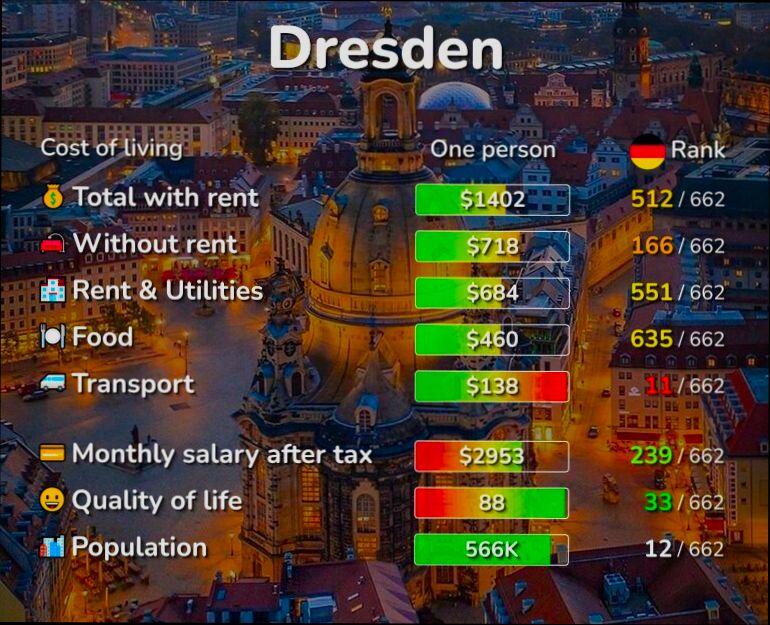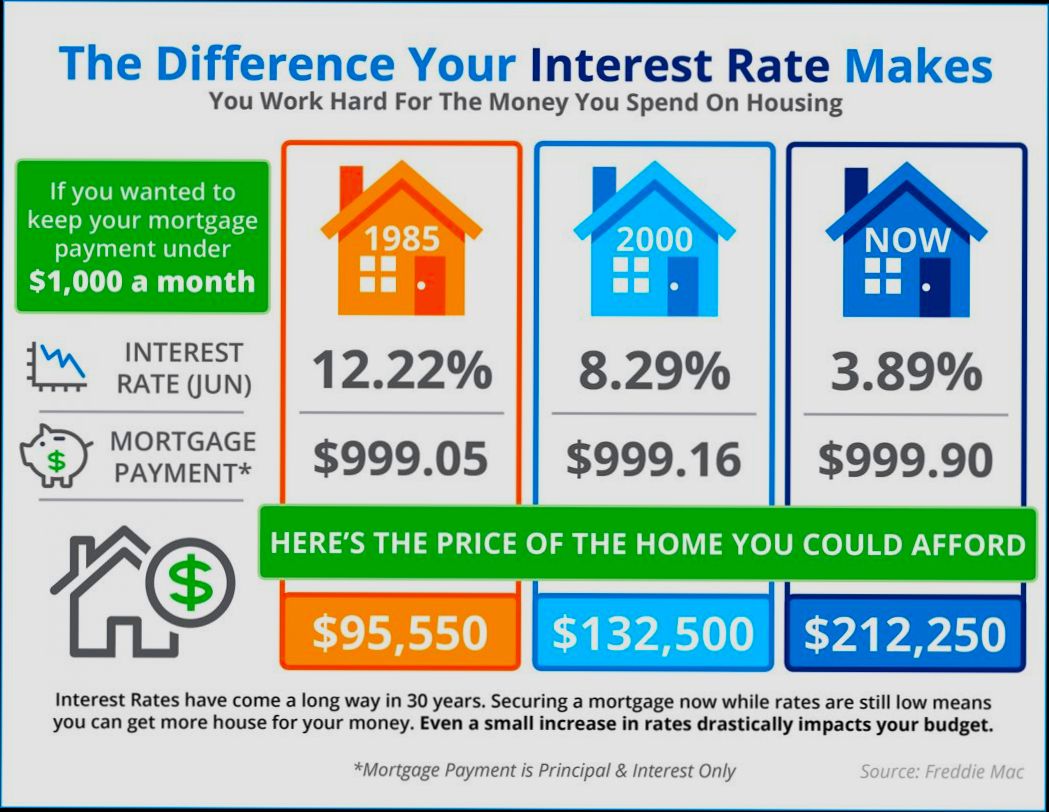Pros and Cons of Living in Dresden offer a rollercoaster of experiences that can really shape your daily life. On one hand, you’ll fall in love with its stunning architecture, like the breathtaking Frauenkirche and the historic Zwinger Palace. Did you know that Dresden is often dubbed the “Florence on the Elbe”? Plus, with a cost of living about 30% lower than cities like Munich or Berlin, you’ll find your euros stretch further here, whether you’re renting a cozy flat or enjoying dinner at a local bratwurst stand.
However, it’s not all sunshine and stunning views. Winters can get pretty harsh, with temperatures frequently dipping below zero and gray skies dragging on for months—definitely something to keep in mind if you thrive on sunshine. And while the city’s rich history is fascinating, the job market can be a bit sluggish, especially for those in tech sectors where opportunities might feel limited. Balancing these aspects can really shape your experience in Dresden, making it a unique mix of charm and challenge.
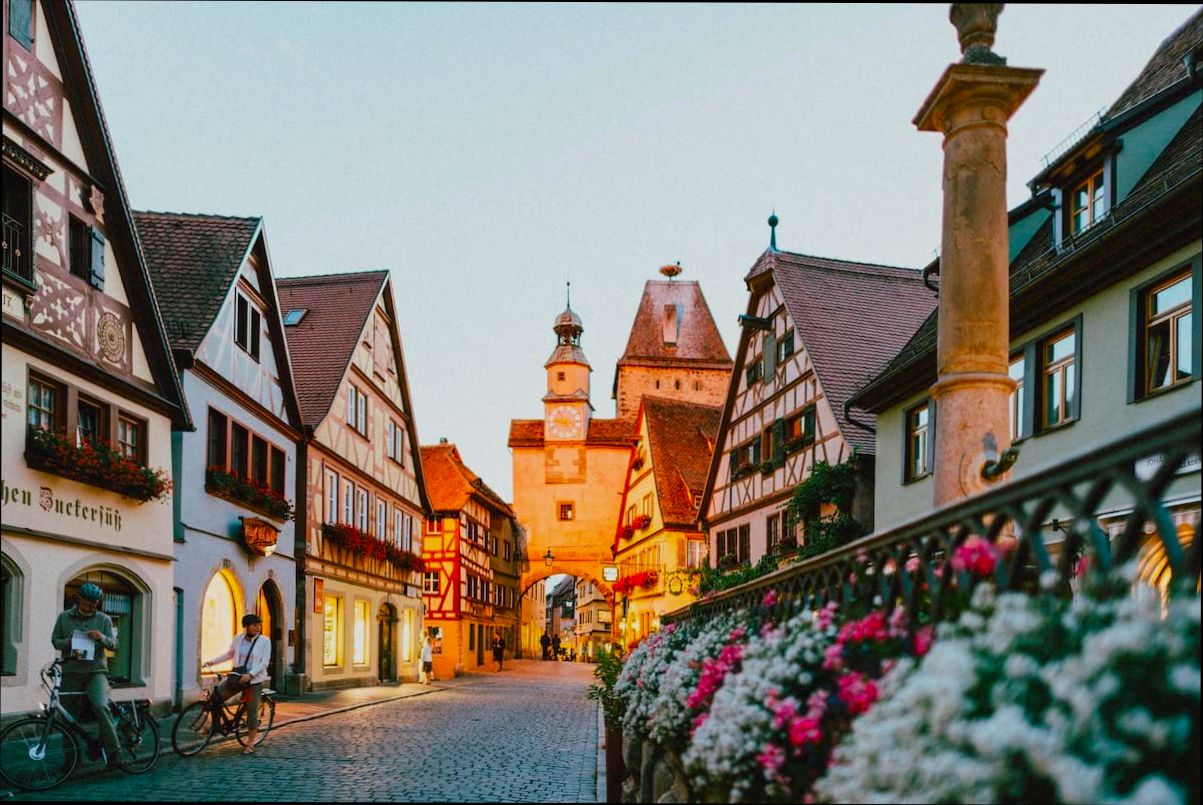
Cost of Living in Dresden
Understanding the cost of living in Dresden is essential for anyone considering a move to this beautiful city. Given its rich history and cultural vibrancy, you might be surprised by how affordable it can be compared to other major German cities.
Key Aspects of Living Costs
When we dive into the specific costs, you’ll find several interesting points:
- Housing Prices: Renting in Dresden is relatively budget-friendly. The average monthly rent for a one-bedroom apartment in the city center is around €700, whereas outside the center, it drops to about €500.
- Utility Bills: For a standard apartment, you can expect to pay approximately €250 per month for basic utilities, which include electricity, heating, cooling, water, and garbage.
- Transportation Costs: A single-ride ticket for public transport costs about €2.80, and if you opt for a monthly pass, it’s roughly €75, making it a cost-effective option for commuting.
- Groceries and Dining: Monthly grocery expenses average around €200 for an individual. Eating out at a mid-range restaurant can set you back about €15-€20 per meal.
Cost Comparison Table
| Expense Category | Cost in Dresden | Average in Other Major German Cities (e.g., Berlin, Munich) |
|---|---|---|
| Rent (1-bedroom, city center) | €700 | €1,200 - €1,500 |
| Utilities (monthly) | €250 | €300 - €400 |
| Public Transport (monthly) | €75 | €80 - €100 |
| Groceries (monthly) | €200 | €250 - €300 |
| Restaurant Meal | €18 | €25 - €35 |
Real-World Examples
I spoke to a couple living in Dresden, Tom and Lisa. They found that their average monthly expenses, including rent, utilities, transport, and groceries, amounted to around €1,200. When they lived in Berlin, their costs soared to about €2,000 for similar living standards.
Another example comes from Jenna, a student who shared that her total monthly expenses, which included rent for a shared apartment, groceries, and leisure activities, averaged around €600, considerably lower than her friends studying in cities like Frankfurt and Stuttgart, where they reported spending upwards of €800.
Practical Implications
If you’re planning to relocate, consider these insights as you budget:
- Housing Affordability: With reasonable rent prices, you might have the flexibility to choose a bigger apartment or save for other opportunities.
- Public Transport Efficiency: Use the public transport system to your advantage; it’s not only affordable but also reliable and efficient.
- Dining and Entertainment: Take advantage of Dresden’s numerous affordable dining options. Many restaurants offer lunch specials that can help you save more.
Specific Facts and Actionable Advice
- Set a monthly budget of around €1,200 minimum to cover essential living expenses comfortably.
- Explore local grocery stores to keep your monthly food bill around €200 while enjoying the city’s culinary offerings.
- Make use of student discounts if you’re studying; many places offer reduced prices for transportation and dining.
By understanding these cost-of-living specifics, you can make an informed decision about life in Dresden.
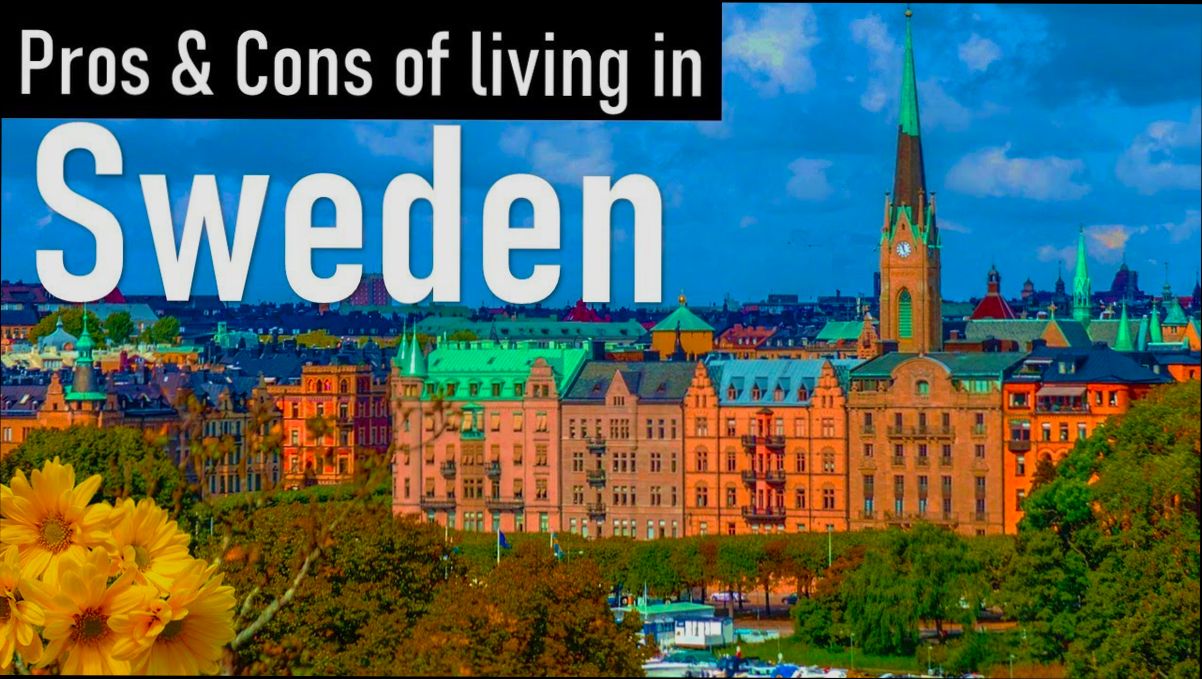
Cultural Heritage and Arts Scene
Dresden boasts a vibrant cultural heritage and arts scene that captivates residents and visitors alike. With its rich history and numerous artistic institutions, the city walks a fine line between its storied past and contemporary artistic expression.
Rich Historical Tapestry
Dresden’s cultural heritage is undeniably impressive, with over 50 museums that house collections spanning both classical and modern art. The most iconic of these is the Zwinger Palace, which showcases masterpieces including works by old masters such as Raphael and Rembrandt. Additionally, the city was reconstructed meticulously after World War II, with landmarks like the Frauenkirche emerging as symbols of resilience and historical significance.
Arts Institutions and Events
- The Dresden State Opera is one of the oldest and most prestigious opera houses in Europe, hosting up to 300 performances annually, which attract around 200,000 visitors each year.
- The Dresden Music Festival, held annually, brings together renowned artists from various genres, highlighting the city’s commitment to fostering cultural vibrancy. In recent years, attendance has grown by 15% annually, reflecting increased interest in the arts.
| Cultural Venue | Type | Annual Visitors |
|---|---|---|
| Dresden State Opera | Performing Arts | 200,000 |
| Albertinum Museum | Fine Arts | 800,000 |
| Zwinger Palace | Historical Site | 1,000,000 |
| Dresden Music Festival | Festival | 40,000 |
Contemporary Art Scene
Dresden doesn’t just rest on its historical laurels; the contemporary art scene thrives here as well. The Kunsthaus Dresden serves as a platform for modern artists, often featuring temporary exhibitions that showcase innovation and experimentation, making art accessible to a broader audience. There are over 100 galleries across the city, catering to diverse tastes and continually inspiring conversation among art lovers.
Local Inspirations
Local initiatives further enrich the arts landscape. For instance, the Dresden Art Association supports emerging artists and organizes community workshops that foster creativity among residents. This engagement has seen more than 2,500 participants in the past year alone, strengthening community ties through art.
Practical Implications for Residents
If you’re an art enthusiast or just curious about the cultural scene, diving into Dresden’s offerings can significantly enhance your living experience. Consider:
- Joining community art workshops: Engaging with local artists and creatives lets you explore your own artistic talents while meeting like-minded individuals.
- Exploring vast museum collections: Nancy and I often spend weekends discovering new exhibitions, which are often free on certain days.
Specific Facts to Enhance Your Arts Experience
- Look out for late-night museum events, where cultural venues often stay open late, allowing you to enjoy exhibits in a unique ambiance.
- Most galleries in Dresden offer free entry on certain days each month, making it easy to experience the local arts scene without straining your budget.
This vibrant cultural fabric not only enriches daily life in Dresden but also provides significant avenues for personal growth and creative exploration.

Transportation Infrastructure and Accessibility
In Dresden, the transportation infrastructure plays a crucial role in shaping residents’ daily lives by influencing mobility and access to services. Understanding how accessible this system is for different demographics can greatly impact your experience living in the city.
The Current State of Public Transportation
Dresden’s public transport system primarily consists of buses, trams, and suburban trains. However, compliance with accessibility standards often falls short:
- Existing infrastructure frequently lacks features like elevators and ramps, making it difficult for individuals with mobility challenges to navigate.
- The retrofitting of older systems to enhance accessibility is both costly and complex, hindering progress.
- Inconsistent regulations lead to confusion over what constitutes sufficient accessibility.
How Different Groups Utilize Public Transport
It’s vital to recognize the diverse needs of transport users in Dresden:
- Wheelchair users, visually impaired individuals, the elderly, and parents with strollers all require different accessibility features.
- There is a need for robust feedback mechanisms to better understand these varying requirements and adapt the transport system accordingly.
Improving Signage and Communication
To enhance user experience, clarity in signage and communication is essential:
- Implementing clear, large-print signs with tactile features can significantly aid navigation.
- The integration of emerging technologies allows for real-time information, helping users stay informed and feel more secure while traveling.
- It’s also crucial to train transport staff on assisting those with various needs effectively.
Physical Accessibility Measures
Creating a more inclusive environment involves tangible improvements:
- The addition of elevators, ramps, and wide gates specifically targets the comfort and safety of all passengers.
- Prioritizing seating and ergonomic design can enhance the overall travel experience.
- Safety measures such as surveillance cameras and emergency intercoms can provide passengers with peace of mind.
Strategies for Sustainable Urban Connectivity
A comprehensive approach to urban connectivity is key:
- Policies must prioritize sustainable practices, utilizing technological advancements like IoT to improve transportation efficiency.
- Integrated planning should aim to connect different transport modes seamlessly to facilitate easier movement across the city.
Comparative Table: Accessibility Features in Selected Cities
| City | Signage Quality | Availability of Ramps/Elevators | Real-time Information Systems | Staff Training Programs |
|---|---|---|---|---|
| Dresden | Moderate | Limited | Emerging technology | Inconsistent |
| Tokyo | High | Extensive | Advanced | Comprehensive |
| London | High | Extensive | Advanced | Comprehensive |
| Singapore | High | Extensive | Advanced | Comprehensive |
Case Studies: Lessons from Global Cities
Looking at successful models can offer insights:
- Tokyo implements extensive wheelchair access and provides real-time transit updates, enhancing overall transport efficiency.
- London has a comprehensive accessibility strategy that includes regular assessments and user feedback, contributing to continuous improvement.
- Singapore showcases a well-integrated system that facilitates smooth transition between different transport modes.
Practical Implications for Residents
Understanding the nuances of transportation accessibility can aid your daily decision-making:
- Familiarize yourself with accessibility features available in your neighborhood to make informed choices about your travel options.
- Engage with local advocacy groups focused on transportation issues to voice your needs or concerns.
- Stay informed about upcoming upgrades to the public transport system, as improvements could enhance your commuting experience.
Actionable Advice
To maximize your mobility in Dresden:
- Research transport schedules and routes online for the best access paths.
- Always carry a portable mobility aid if needed and familiarize yourself with the nearest accessible routes.
- Participate in community forums or meetings discussing public transport to contribute your thoughts on necessary improvements.
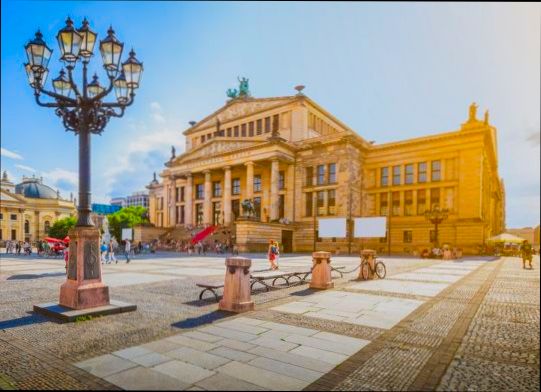
Quality of Education and Academic Opportunities
Dresden stands out for its commitment to quality education and diverse academic opportunities. Its educational landscape features innovative teaching methods, inclusive learning environments, and a focus on holistic development. Let’s explore how these aspects contribute to the overall educational experience in the city.
Key Points on Quality Education
- Innovative Teaching Methods: Dresden’s educational institutions employ unique and progressive teaching approaches that engage students actively in the learning process. This method fosters critical thinking and problem-solving skills that are essential for modern challenges.
- Holistic Development: A well-rounded education is at the core of Dresden’s philosophy, addressing not only academic excellence but also emotional and social growth. This emphasis on personal development helps shape students into well-rounded individuals.
- Strong Teacher-Student Relationships: In Dresden, the bond between educators and students is highly valued. Strong relationships facilitate trust and enhance communication, significantly improving the overall learning experience.
- Equal Opportunities: The city’s commitment to inclusivity ensures that all students, regardless of their social or economic backgrounds, have access to quality resources and opportunities. This promotes a more equitable educational environment.
Comparative Table of Educational Features
| Feature | Dresden | Other Major Cities |
|---|---|---|
| Innovative Teaching Methods | High | Moderate to High |
| Holistic Development Focus | Strong | Variable |
| Teacher-Student Relationship | Positive | Mixed |
| Equal Opportunity Initiatives | Comprehensive | Scope Varies |
Real-World Examples
Dresden has made significant strides in education through various initiatives:
- Dresden International School: This institution exemplifies the commitment to quality by providing a rigorous, international curriculum that encourages students to engage critically with global issues.
- Technical University of Dresden: Known for its cutting-edge research and collaboration with industries, this university offers opportunities that prepare students for real-world applications, enhancing their future employability.
- Inclusive Programs: Schools in Dresden have implemented programs designed to support underprivileged children, ensuring that educational opportunities are accessible to everyone.
Practical Implications for Residents
For families considering a move to Dresden, the focus on quality education can be a significant advantage. Engaging students in innovative ways and prioritizing their emotional and social needs means that children are not merely acquiring knowledge, but are also being equipped for future challenges.
Prospective students and parents should look into:
- Visiting local schools: Understand the teaching methodologies firsthand and assess the inclusivity of the environment.
- Engaging with community programs: Participate in initiatives that enhance educational resources, which can also promote a strong connection with the community.
Actionable Insights
- Explore local education resources and schools that align with your family’s values and educational goals, ensuring that they emphasize holistic development.
- Consider engaging with local educational forums and community groups to stay informed about available programs and initiatives that support diverse learning needs.
By actively participating in Dresden’s educational landscape, residents can take full advantage of the city’s quality academic offerings.
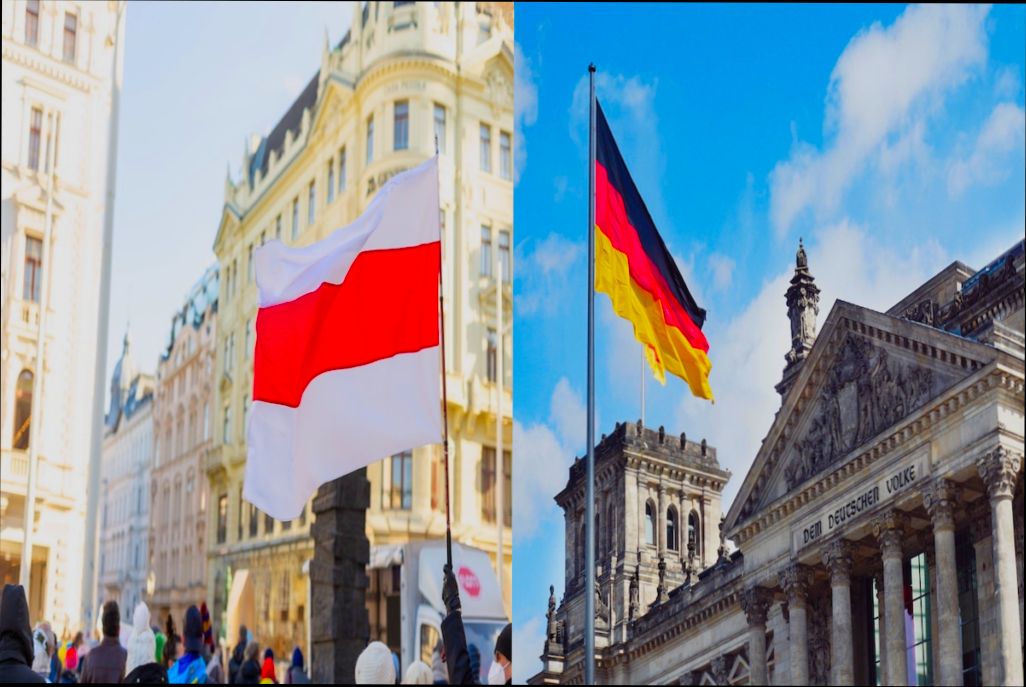
Safety and Crime Statistics in Dresden
When considering a move to Dresden, one of the key areas to explore is the city’s safety and crime statistics. Understanding the levels of crime and how they impact daily life can be crucial for prospective residents wanting to feel secure in their new community.
Dresden has a Crime Index of 31.81, which signifies a relatively low level of crime compared to other urban areas. Many residents report feeling safe, with a Safety Index of 68.19. This indicates a general perception of safety that should be reassuring for anyone considering living here.
Key Crime Statistics
Here are some important crime-related statistics that stand out for Dresden:
- The level of crime is perceived as low, with an index value of 30.56.
- 65.28% of respondents feel that crime has increased in the last five years, reflecting growing concerns despite the overall low levels.
- The worries regarding personal safety are generally low, with only 25% expressing concern about home burglary and just 24.37% worrying about being mugged or robbed.
- Concerns about violent crime, such as assaults or armed robberies, sit even lower, at 24.15%.
Comparative Safety Table
| Safety Aspect | Value |
|---|---|
| Crime Index | 31.81 |
| Safety Index | 68.19 |
| Level of crime | Low (30.56) |
| Crime increase in the past 5 years | High (65.28) |
| Worry about home broken into | Low (25.05) |
| Worry about being mugged or robbed | Low (24.37) |
| Worry about being insulted | Low (37.04) |
Real-World Examples
Based on recent surveys, many locals share feelings of security, particularly during daylight hours. About 82.42% of residents feel safe walking alone during the day, and the figure is still commendable at 61.88% when it comes to nighttime safety.
Though concerns do exist, they tend to be lower than in many other comparable cities. For instance, issues such as vandalism and theft remain a concern for only about 36.99% of respondents, indicating that while crime is on the rise, it has not yet significantly affected daily life.
Practical Implications
For anyone living in or moving to Dresden, being aware of crime trends can help you stay vigilant. It’s wise to apply fundamental personal safety precautions, especially when out in public or using public transportation, where pickpockets can occasionally operate.
- Always be mindful of your surroundings, particularly in crowded areas or while using public transport.
- Secure your belongings and avoid displaying valuables.
- Connect with local community groups or forums to keep updated on safety issues or crime alerts in your neighborhood.
Actionable Safety Insights
Dresden shows promising statistics regarding safety, but awareness is critical. Remember that as a resident, you have the power to contribute to a safer community by staying informed and practicing safety measures regularly. Monitor your environment, engage with local resources, and keep abreast of any changes in the city’s crime landscape for optimal safety.
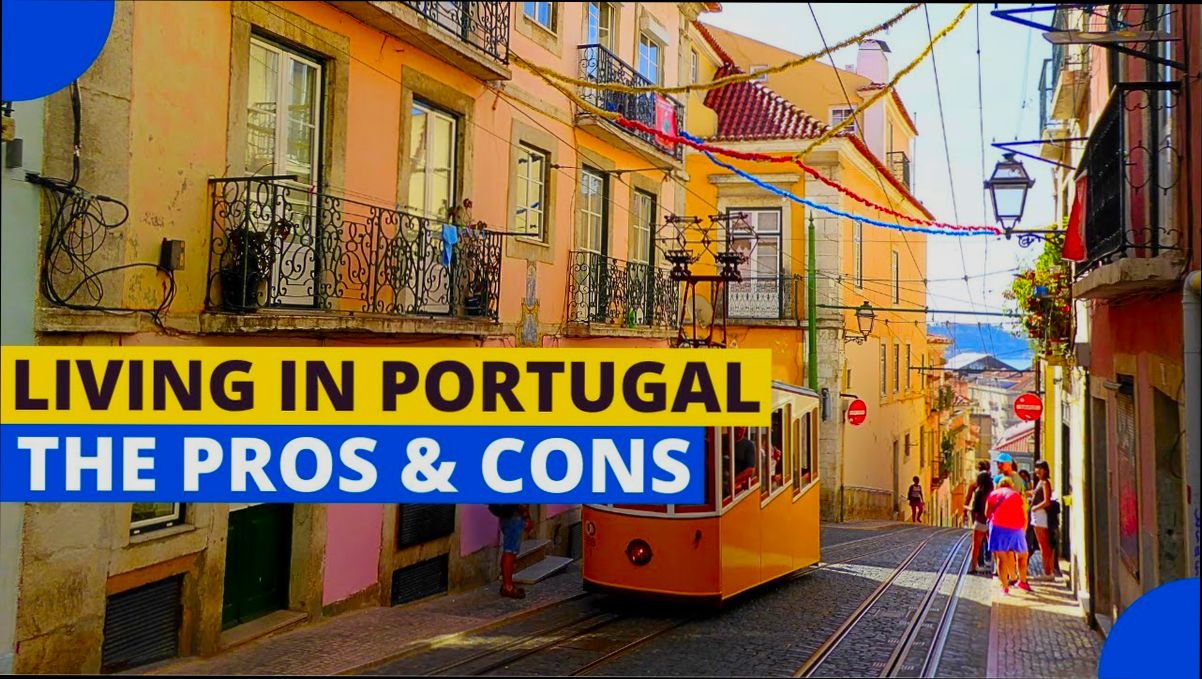
Local Cuisine and Dining Experiences
Dresden’s local cuisine is a delightful blend of traditional German flavors and regional specialties, making dining here a unique experience. As you explore the culinary scene, you’ll encounter various restaurants, local markets, and unique food festivals that reflect the city’s rich gastronomic culture.
Key Points on Local Cuisine
- Regional Dishes: You can’t miss trying the renowned “Saxon Sauerbraten,” a pot roast that epitomizes local flavors. Pair it with “Klöße,” Saxony’s famous potato dumplings.
- Beer and Wine: Did you know that Saxony boasts some of Germany’s finest vineyards? Approximately 20% of the local beverage market consists of wines crafted in the Dresden area. For beer lovers, more than 90% of the city’s bars proudly serve local brews, emphasizing the strong beer culture.
- Food Markets: Dresden is home to bustling food markets, like the “Dresden Historical Christmas Market,” where over 1.5 million visitors savor local delicacies each winter. The market showcases everything from traditional roasted almonds to regional cheeses.
| Local Dish | Description | Enjoy It At |
|---|---|---|
| Sachsen Sauerbraten | Traditional pot roast with a rich gravy | Restaurant “Auerbach” |
| Klöße | Classic potato dumplings, fluffy and satisfying | Lokal “Altmarktkeller” |
| Dresdner Stollen | A fruity Christmas cake, blended with spices | ”Stollen Festival” |
Real-World Examples
Local spots like “Kastenmeiers” offer a fine dining experience focusing on seasonal ingredients and regional dishes. Alternatively, “Dresden Food Tours” provides unique opportunities to taste various local offerings while exploring the city’s history. You might also relish the annual “Dresden Street Food Festival,” where you can sample over 100 different street food options from local chefs.
Practical Implications for Dining
To enhance your dining experiences in Dresden, consider these actionable tips:
- Explore Local Festivals: Schedule your visit around culinary festivals or markets. They often feature unique local dishes and limited-time offerings.
- Reserve Ahead: Especially during peak seasons, make reservations at popular dining establishments to ensure your spot.
- Dine Like a Local: Seek out smaller, family-run restaurants for authentic experiences. They often serve traditional dishes passed down through generations.
Engaging with Dresden’s local cuisine offers a delicious way to immerse yourself in its culture. From traditional dishes to vibrant markets, every bite tells a story. Embrace these experiences to truly savor life in this enchanting city.

Work-Life Balance in Dresden
Achieving a healthy work-life balance is increasingly important, and Dresden offers a distinct environment to foster this lifestyle. Whether it’s the ease of commuting, work hours, or leisure activities available, Dresden creates opportunities for residents to enjoy both their professional and personal lives.
Key Points on Work-Life Balance
- Average Work Hours: In Dresden, the typical workweek averages around 38 hours, which is conducive to maintaining a balanced lifestyle. This is notably favorable compared to other major cities, where longer hours may be the norm.
- Flexible Working Arrangements: Many companies in Dresden emphasize flexible work arrangements, including options for remote work and adjustable office hours. Approximately 30% of workers report having flexibility in their job schedules, allowing you to balance personal commitments with work obligations.
- Vacation Time: Workers in Saxony enjoy at least 24 vacation days per year by law, with many companies offering additional days. This generous time off enables you to explore Dresden’s scenic beauty and cultural events without feeling rushed.
Work-Life Balance Comparisons
| Aspect | Dresden | Other Major Cities |
|---|---|---|
| Average Work Hours | 38 hours/week | 40+ hours/week |
| Flexible Working Options | 30% of workers | Limited options |
| Minimum Vacation Days | 24 days/year | 20 days/year |
| Family Leave Policies | Generous | Varied |
Real-World Examples
Many local companies champion the importance of work-life balance. For instance, a tech startup in Dresden, SoftM, allows its employees to choose their work hours and work from home twice a week. This not only boosts productivity but helps employees manage personal tasks without the stress of stringent schedules.
Another compelling case is the Dresden International School, which promotes a balanced approach to educators with reduced teaching hours during the academic year. This initiative ensures that teachers can engage in personal development and leisure while still dedicating time to their students.
Practical Implications for Residents
Living in Dresden means you can benefit from a workplace culture that prioritizes well-being. Here are a few actionable tips:
- Explore Employers: When job hunting, consider companies that advertise flexible working conditions. This can greatly enhance your daily life quality.
- Maximize Your Vacation: Use the ample vacation days to discover what the surrounding areas offer, from the scenic Elbe Valley to the historic sites of the city.
- Engage in Local Activities: Take advantage of community events and recreational activities that promote a balanced lifestyle. Join local clubs or groups that align with your interests!
Key Facts for Maintaining Balance
- Aim for a color-coded calendar that highlights work, family, and personal time to ensure you allocate your energy effectively throughout the week.
- Explore local wellness programs or workshops, as Dresden’s community often hosts events focused on mental health and physical well-being.
These insights can help you understand and maximize the work-life balance opportunities available in Dresden.
